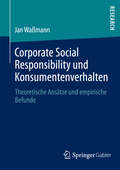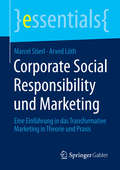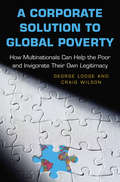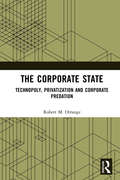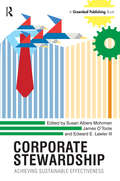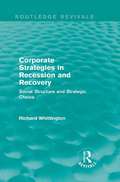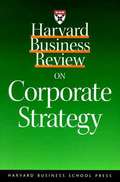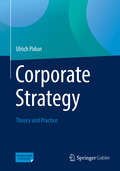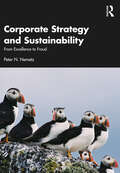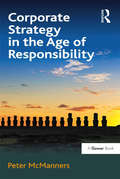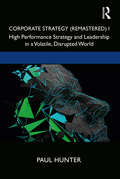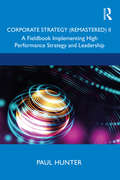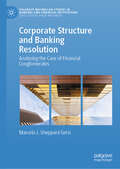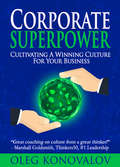- Table View
- List View
Corporate Social Responsibility und Konsumentenverhalten: Theoretische Ansätze und empirische Befunde
by Jan WaßmannUnternehmen erhoffen sich von der Kommunikation ihrer gesellschaftlichen Verantwortung Imagegewinne und eine höhere Kundenloyalität. Tatsächlich bleiben viele CSR-Aktivitäten im Marketingkontext in der Praxis wirkungslos. Die Monographie untersucht daher sowohl theoretisch als auch anhand eines empirischen Experiments, inwiefern die unterschiedliche Ausgestaltung und Kommunikation von CSR-Aktivitäten einen Einfluss auf die Markenwahrnehmung des Konsumenten ausübt. Hierbei zeigt sich, dass die Motivattribution des Konsumenten ein wesentlicher Mediator bei der Verarbeitung von CSR-Informationen ist, der durch das Marketingmanagement gezielt beeinflusst werden kann. Damit bietet die Arbeit neue Erkenntnisse für die Marketingforschung und -praxis.
Corporate Social Responsibility und Marketing: Eine Einführung in das Transformative Marketing in Theorie und Praxis (essentials)
by Marcel Stierl Arved LüthZur praktischen Umsetzung von Corporate Social Resonsibility (CSR) stellen Marcel Stierl und Arved Lüth erstmals das Konzept des transformativen Marketing vor und ergänzen es mit Tools aus der Beratungspraxis. Konkrete Instrumente und Fallbeispiele erleichtern eine Umsetzung von CSR in die Unternehmenspraxis. CSR ins Marketing zu integrieren, bedeutet die eigene Geschäftstätigkeit ökonomisch, ökologisch und sozial weiterzuentwickeln und sich gegenüber seinen Stakeholdern entsprechend zu positionieren. Zusätzlich sollten Stakeholder zu nachhaltigen Verhaltensweisen informiert und animiert werden.
Corporate Social Strategy
by Bryan W. Husted David Bruce AllenCan good-will be good business? Firms are increasingly called upon to address matters such as poverty and human rights violations. The demand for corporate social responsibility (CSR) is directed mainly at top management in multinational corporations who are reminded that, in addition to helping to make the world a better place, their commitment to social action will be rewarded by lasting customer loyalty and profits. But is it true that firms that engage in social action will be rewarded with a good name, competitive advantage, superior profits and corporate sustainability? What if it is true for some firms and not for others? This book addresses these and other questions by explaining the how and why of creating value and competitive advantage through corporate social action. It shows how and when firms can develop successful corporate social strategies that establish strong commitments to shareholders, employees and other stakeholders.
A Corporate Solution to Global Poverty: How Multinationals Can Help the Poor and Invigorate Their Own Legitimacy
by George Lodge Craig WilsonWorld leaders have given the reduction of global poverty top priority. And yet it persists. Indeed, in many countries whose governments lack either the desire or the ability to act, poverty has worsened. This book, a joint venture of a Harvard professor and an economist with the International Finance Corporation, argues that the solution lies in the creation of a new institution, the World Development Corporation (WDC), a partnership of multinational corporations (MNCs), international development agencies, and nongovernmental organizations (NGOs). In A Corporate Solution to Global Poverty, George Lodge and Craig Wilson assert that MNCs have the critical combination of capabilities required to build investment, grow economies, and create jobs in poor countries, and thus to reduce poverty. Furthermore, they can do so profitably and thus sustainably. But they lack legitimacy and risk can be high, and so a collective approach is better than one in which an individual company proceeds alone. Thus a UN-sponsored WDC, owned and managed by a dozen or so MNCs with NGO support, will make a marked difference. At a time when big business has been demonized for destroying the environment, enjoying one-sided benefits from globalization, and deceiving investors, the book argues, MNCs have much to gain from becoming more effective in reducing global poverty. This is not a call for philanthropy. Lodge and Wilson believe that corporate support for the World Development Corporation will benefit not only the world's poor but also company shareholders as a result of improved MNC legitimacy and stronger markets and profitability.
Corporate Solutions at Jones Lang LaSalle
by Ranjay Gulati Lucia MarshallPeter Barge, CEO of the newly created Corporate Solutions Group of Jones Lang LaSalle (JLL), is executing a restructuring of the U.S. corporate real estate services division that will enable the company to offer its clients integrated solutions. Barge has created an account management function to coordinate the activities of the three, product-based business units which, until now, have operated autonomously. As he is executing the restructuring, Bank of America, an important account of the firm, announces its intention to reduce its providers to the two or three who can offer forward-looking, integrated services. While Barge's new organization is not yet fully in place, he is determined to win the Bank of America business, and moves quickly to hire a senior account manager and establish an organizational architecture that will encourage collaboration within his group. The case examines the many tradeoffs Barge must make in balancing the benefits of the former organization with those of the new structure to achieve the firm's strategic goal of becoming more customer solutions oriented.
Corporate Sovereignty: Law and Government under Capitalism
by Joshua BarkanRefinery explosions. Accounting scandals. Bank meltdowns. All of these catastrophes—and many more—might rightfully be blamed on corporations. In response, advocates have suggested reforms ranging from increased government regulation to corporate codes of conduct to stop corporate abuses. Joshua Barkan writes that these reactions, which view law as a limit on corporations, misunderstand the role of law in fostering corporate power.In Corporate Sovereignty, Barkan argues that corporate power should be rethought as a mode of political sovereignty. Rather than treating the economic power of corporations as a threat to the political sovereignty of states, Barkan shows that the two are ontologically linked. Situating analysis of U.S., British, and international corporate law alongside careful readings in political and social theory, he demonstrates that the Anglo-American corporation and modern political sovereignty are founded in and bound together through a principle of legally sanctioned immunity from law. The problems that corporate-led globalization present for governments result not from regulatory failures as much as from corporate immunity that is being exported across the globe. For Barkan, there is a paradox in that corporations, which are legal creations, are given such power that they undermine the sovereignty of states. He notes that while the relationship between states and corporations may appear adversarial, it is in fact a kind of doubling in which state sovereignty and corporate power are both conjoined and in conflict. Our refusal to grapple with the peculiar nature of this doubling means that some of our best efforts to control corporations unwittingly reinvest the sovereign powers they oppose.
Corporate-Startup-Partnerschaften: Innovation durch Kollaboration (Organisationskompetenz Zukunftsfähigkeit)
by Jasmin Weber Alexander ElzEtablierte Unternehmen sehen sich zunehmend mit Entwicklungen konfrontiert, die die Anforderungen an ihre Transformationsgeschwindigkeit erhöhen – so wird das Rennen um die vorderen Plätze beispielsweise durch die Digitalisierung angefacht. Dabei stellen sie immer häufiger fest, dass ihnen der eigene, teils jahrzehntelange Erfolg durchaus im Weg stehen kann und die benötigte Innovationskraft oft nicht innerhalb, sondern außerhalb des Unternehmens zu finden ist. Eine Möglichkeit, diesen Herausforderungen zu begegnen, ist die Kollaboration mit Startups.Corporate-Startup-Partnerschaften vereinen die Kapazitäten etablierter Unternehmen mit der Flexibilität von Startups, was zu mehr Innovationsfähigkeit und damit Wettbewerbsvorteilen führen kann. In diesem Buch werden die Vor- und Nachteile solcher Partnerschaften, die Hebel für ihren Erfolg und die Phasen ihrer Evolution durch erfahrene Expert:innen beschrieben. Praktische Handlungsempfehlungen ergänzen die detaillierte Analyse.
The Corporate State: Technopoly, Privatization and Corporate Predation
by Robert M. OrrangeThis book critically examines key features of the contemporary organizational landscape by focusing on major beneficiaries of recent historical politicalcultural transformations involving the embrace of market fundamentalism and a market society: corporations, those who direct them, and those who use them for their own benefit. Part I examines the big US-based tech firms (i.e., Facebook, Google, Apple, and Amazon), highlighting numerous tensions and contradictions between their highly cultivated, flattering, yet unwarranted public images and the reality of how they operate as extremely competitive, at times deceptive, profitseeking entities. A focus on these firms also highlights just how dramatically the economic realm has been transformed over the past few decades due to accelerating advances in information technology and corporate-managed globalization. Part II explores how the state has been pushed back via privatization and corporate predation in such areas as health care, military/security, criminal justice, philanthropy, and education and concludes by looking forward with a vision of a knowledge-caring society that must rebalance corporate-managed market fundamentalism. Through the use of clear cases that bring the theory to life for students, the book is ideal as a supplementary text for advanced undergraduate and graduate students in a range of coursework in the fields of organizational theory and behavior, leadership in organizations, and management responsibility and business ethics. It will also be of great interest to students of sociology, specifically in the areas of complex organizations, economic sociology, theory, political sociology, and law and society.
Corporate Stewardship: Achieving Sustainable Effectiveness
by Susan Albers Mohrman Edward E. Lawler III James O'TooleStewardship entails a profound understanding and acceptance of the challenges that result from the organization’s interdependence with the societal and ecological contexts in which it operates—and of what it takes to embrace the challenges to be a force for building a viable future. This book dares to ask ‘why’ business leaders should embrace stewardship in the current market where profit reigns supreme. A shift in approach represents fundamental change for the corporate world, and even the most advanced corporations consider themselves to be in the starting block of this transition. The book sets out the practical ways in which corporate stewardship can be achieved through embedding new approaches across the different functions of a business. This book, written by the leading thinkers in sustainability research, provides practical guidance on how companies can resolve the paradoxical challenges they face. How can they be at the same time profitable and responsible, effective and ethical, sustainable and adaptable? It explores what businesses are doing, what they can and should do to effectively respond to external challenges, and focuses on how leaders can create cultures, strategies, and designs far beyond “business as usual”.Stewards must not only make proper current use of that which they hold in trust, they also must leave it in better condition for use by future generations. Corporate Stewardship challenges managers, executives, and directors of global corporations to think and act as stewards of both their organizations and the physical and social environments in which they operate.
Corporate Strategies in Recession and Recovery: Social Structure and Strategic Choice (Routledge Revivals)
by Richard WhittingtonFirst published in 1989, this book is based on detailed comparative case studies of eight firms’ responses to the recession of the early 1980s, the worst crisis for British manufacturing in the post-war period. Following these companies’ progress from 1979 to 1985, Whittington examines the various recession strategies they adopted and the consequences of these for management change and financial performance in the recovery. Drawing on the Realist social theory of Roy Bhaskar, Whittington argues that the class, gender, generation and ethnicity of the decision-makers involved in the eight case studies collectively made an impact on their strategic choices. This is a timely and practical reissue, which will be of value to students, managers and academics concerned with strategic management, developments in organizational theory, and the current economic climate.
Corporate Strategy: The Quest for Parenting Advantage
by Marcus Alexander Andrew Campbell Michael GooldWhile the core competence concept appealed powerfully to companies disillusioned with diversification, it did not offer any practical guidelines for developing corporate-level strategy. To fill the gap, the authors propose the parenting framework, with tools for answering two questions: Which business should a company own? What parenting approach will get the best performance from those businesses? To determine the fit between a parent and its businesses, corporate strategists should look at four areas: the critical success factors of the business, the parenting opportunities in the business, the characteristics of the parent, and the financial results. Next, to determine which businesses to keep and which to divest, they should rank them into five categories: those that fit well; those that fit in some ways; those that fit but have little potential; those with a possibility of value destruction; and those that fit in parenting opportunities but not in critical success factors.
Corporate Strategy: A Conceptual Framework
by David J. CollisProvides a conceptual framework for the study of corporate strategy. First describes previous perspectives on corporate strategy and then develops a framework of four elements: resources, tasks, structure, and industries. This framework can be used to explain the value corporations add to their businesses, how they should be organized, and the limit to the scope of the firm. Finally, describes four steps involved in the formulation of a corporate strategy.
Corporate Strategy: A Feminist Perspective (Routledge Research in Strategic Management)
by Angelique Du-ToitThis book takes a fresh look at corporate strategy, exploring it from a feminist perspective. Challenging male-dominated theory, Corporate Strategy looks at unquestioned assumptions held about strategy in practice and academia, including whether women approach strategy differently from men, and if so, how their approach differs? Reviewing the histories of strategy and feminism, the book explores the reasons why so few serious works on strategy have been written by women, and investigates the continued lack of women at senior levels within many organizations. Angélique du Toit draws on postmodern arguments to illustrate the claims made for the necessity of diversity within organizations, and challenges the fact that positions of power, both in society and organizations remain the exclusive right of men. Corporate Strategy argues that if an organization is to survive and succeed in the global economy, it has to pay more than lip service to issues surrounding diversity.
Corporate Strategy: Theory and Practice
by Ulrich PidunThis textbook offers a personal perspective on the broad and complex topic of corporate strategy. The book is structured to follow the journey of systematic corporate strategy development and implementation. “Corporate Strategy” presents frameworks and concepts for strategy development that have proven to be useful in corporate practice. The book covers the fundamental questions of daily strategy work and illustrates them with examples from real companies. It addresses all key elements of corporate strategy in a clear and systematic way: • Corporate ambition and capabilities • Corporate portfolio analysis • Corporate growth and portfolio strategy • Managing and transforming the corporate profile • Corporate parenting strategy and organization • Corporate financial strategy • Corporate strategy process The book serves not only as a practice-oriented textbook for students and teachers of corporate strategy, it also functions as a sophisticated handbook for practitioners who are responsible for developing and implementing effective corporate strategies.
Corporate Strategy
by Puranam, Phanish and Vanneste, Bart Phanish Puranam Bart VannesteMany companies are not single businesses but a collection of businesses with one or more levels of corporate management. Written for managers, advisors and students aspiring to these roles, this book is a guide to decision-making in the domain of corporate strategy. It arms readers with research-based tools needed to make good corporate strategy decisions and to assess the soundness of the corporate strategy decisions of others. Readers will learn how to do the analysis for answering questions such as 'Should we pursue an alliance or an acquisition to grow?', 'How much should we integrate this acquisition?' and 'Should we divest this business?'. The book draws on the authors' wealth of research and teaching experience at INSEAD, London Business School and University College London. A range of learning aids, including easy-to-comprehend examples, decision templates and FAQs, are provided in the book and on a rich companion website.
Corporate Strategy and Structure: Historical Perspective
by Robert S. Kaplan David P. NortonOrganizations have struggled for more than a century to find the ideal structures to manage their strategies. From Adam Smith's prototypical pin factory to the strategy-focused organization, this chapter provides an historical perspective on the evolution of the organization, illuminating how Balanced Scorecard innovation enables companies to design their operating systems to align structure with strategy.
Corporate Strategy and Sustainability: From Excellence to Fraud
by Peter N. NemetzCorporate Strategy and Sustainability is a substantially updated, detailed overview of sustainability issues for business and economics students. Built to teach the evolution of the history of sustainability practices, this edition has expanded coverage of social sustainability issues, non-Western perspectives and sustainable supply chains. Rich in cases, these too have been updated to demonstrate best practice and the practical application of theory. Extensive discussions of tools show how incorporate sustainability issues apply to strategic decision making. The book accentuates the value and importance of a strong sustainability approach in an age of climate change emergency. This textbook is an ideal companion to instructors and students of sustainability in business, economics and management.
Corporate Strategy at Berkshire Partners
by Scott Waggoner Julie M. WulfThe managing directors of Berkshire Partners, a mid-sized private equity firm, address strategic and organizational challenges in response to turbulent market conditions, rapid firm growth, and the transition of leadership from its founding partners to the next generations. To address some of these dynamics, and to protect Berkshire's corporate advantage, the managing directors established three executive oversight committees, developed new specialized corporate functions, and incubated an internal hedge fund group. Students are given the opportunity to assess Berkshire's recent changes in corporate strategy and organizational design and to formulate recommendations going forward.
Corporate Strategy: A Conceptual Framework
by David J. CollisProvides a conceptual framework for the study of corporate strategy. First describes previous perspectives on corporate strategy and then develops a framework of four elements: resources, tasks, structure, and industries. This framework can be used to explain the value corporations add to their businesses, how they should be organized, and the limit to the scope of the firm. Finally, describes four steps involved in the formulation of a corporate strategy.
Corporate Strategy in the Age of Responsibility
by Peter McMannersAs the era of ever expanding markets and ample resources ends, governments and business will have to behave differently. The world is facing weak economic growth, limits to affordable resources and increasing concerns about environmental consequences. During the boom times, governments championed de-regulation and business responded by adopting an anything-goes attitude. In these straitened times, strategic analysis has to engage with the challenges that society faces to create resilient corporations fit for the 21st century. In Corporate Strategy in the Age of Responsibility, Peter McManners, who has for nine years run strategy workshops on the Henley MBA focusing on the global business environment, sets about providing a strategic framework for navigating the new economic environment. Chief Sustainability Officers (CSOs) now exist, but they struggle to find the strategic rationale for the improvements they champion. The author argues that their good intentions often lack traction, partly because others in management don’t get it, but also because they are not ambitious enough. The book is not about preaching semi-charitable behaviour or how to enhance the reputation of the corporation instead it is about surviving and thriving in a challenging and changing environment. A corporate audience familiar with strategy books will relate to this book, but will find it steers them towards radically new strategic thinking suitable for a turbulent period of transition.
Corporate Strategy (Remastered) I: High Performance Strategy and Leadership in a Volatile, Disrupted World
by Paul HunterSince 2000, more than half of the Fortune 500 companies have either gone bankrupt, been acquired, or are experiencing stagnation or decline as a result of extreme digital and social disruption. In recognition of this dilemma, Corporate Strategy (Remastered) was developed and designed to assist even the most experienced strategy practitioner tackle disruption and all aspects of change head on. This is the first book in the series; it provides a prescriptive solution to the way all approaches to strategy should be practiced. It embodies a context we refer to as Third Wave Strategy and its construct, a fully integrated Strategic Management Framework. The second volume is a fieldbook; it describes the methods and means to ensure successful implementation. An illustration of Third Wave Strategy in practice is reflected in a description of strategy deployed by the highly successful Amazon corporation. Many of the components of strategy that are included in the framework will already be familiar to the reader, while others are very new. Each of the individual components discussed are supported by examples drawn from real-life case studies. The overall value of the book is its representation of a fresh, holistic, dynamic and systemic approach to strategy in a format that, frankly, hasn’t existed before. In this book, readers are also introduced to many of the soft/human elements of strategy – the primary components that make it work. Examples of topics addressed include open strategy; communities of strategy practice; reframing; sponsive strategic thinking; systemic, cognitive strategy practice; organisational learning; and strategic business intelligence.
Corporate Strategy (Remastered) II: A Fieldbook Implementing High Performance Strategy and Leadership
by Paul HunterSince the onset of the Fourth Industrial Revolution numerous corporations have found that traditional ‘strategic planning’ is ineffectual in responding to, or capitalising on, unforeseen or unexpected change. In recognition of this and associated symptoms of inertia, bankruptcy or worse, this fieldbook was written for the purpose of guiding strategy practitioners through their intended or unintended journey into the future by providing meaningful strategy practices that enable responses to disruption and more importantly, better strategy practices overall. With a focus on strategy practice (‘doing’ strategy), this book represents a ‘how-to’ of Third Wave Strategy as defined in detail in the introductory book Corporate Strategy (Remastered) I. In addition to a description of methods that contribute to the philosophy of Third Wave Strategy, readers will witness the experiences of a virtual illustrative company that is travailing the same journey of organisational transformation and renewal that the methodologies described in this book also seek to address. The overall value of the book, therefore, is its ability to relate theory to practice in a factual and experiential format. A key part of the use of the virtual case study based on the illustrative Third Wave Industries (T-wI) Corporation is the blending of the system and process mechanisms that are a part of Third Wave Strategy and its framework, the strategy tools and techniques that are drawn from new and existing strategy practice and the soft issues that are represented by the human responses to change, as well as the management of change enacted in a corporate environment.
Corporate Structure and Banking Resolution: Analysing the Case of Financial Conglomerates (Palgrave Macmillan Studies in Banking and Financial Institutions)
by Marcelo J. Sheppard GelsiThis book provides a legal analysis of the regulation of bank-based financial conglomerates from a structural, commercial, and regulatory perspective. It includes a comparative analysis of the regulation of bank-based financial conglomerates from the standpoint of the three jurisdictions that established a distinct regulatory model, i.e. Germany, the UK, and the US. At the same time, it analyses which banking resolution strategy is most appropriate for different models, taking into account four factors applicable to bank insolvency. The book further examines the types of capital structure associated with each model, and in particular how BBFCs have influenced industry developments in Germany, the United Kingdom, the United States, and the EU. While there are several books that focus on the regulation of banks, insurance companies, and securities firms, this book will include the first analysis of BBFC from a structural, commercial, and resolution standpoint, analysing not only the three major jurisdictions but three different BBFC models, and will be of particular interest to students, researchers, and professors of banking and financial institutions.
Corporate Superpower: Cultivating A Winning Culture For Your Business
by Oleg KonovalovWinner of the Readers&’ Favorite® silver medal! &“Can help your organization create the culture needed to move to the next level of success.&”—Marshall Goldsmith, Thinkers50, #1 Leadership Thinker, #1 Executive Coach in the World Culture is the soul of any organization, whether a gas station, church or international corporate powerhouse. A strong culture breeds loyalty, innovation, and success. A weak culture will breed cynicism, apathy, instability, and the eventual demise of the organization. Yet, culture is an often-overlooked aspect of business thinking and strategy. Positive culture can&’t be maintained without such critical factors as respect, job satisfaction, involvement, loyalty, shared affection, preparedness to change, and responsibility, which defines the engagement of everyone in an organization. Teamwork, innovativeness, professionalism, accountability, shared vision, and trust form the main asset of any organization, its metaphysical resources. They define the nature of psychological power residing in culture and have direct impact on a company&’s performance and achievement of its goals. Whether or not this potential is realized depends on how effectively it is exploited. In this book, a reader will learn what culture is, why it is important and how to fix it when it goes wrong. Leaders, management, as well as employees on the front lines will benefit from the discussion. This book is for those rising above the ordinary every day. &“This book is among the most comprehensive, insightful and educational books I have ever read on how to build a world-class culture. This a must read on this extremely critical topic.&”—John Spence, Top 100 Business Thought Leader & Small Business Influencer in the USA
